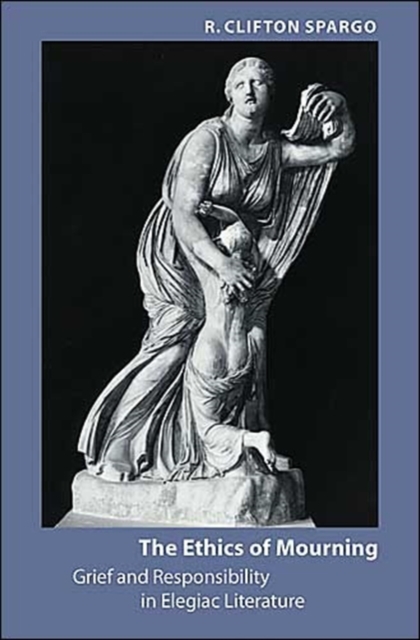
The Ethics of Mourning : Grief and Responsibility in Elegiac Literature Hardback
by R. Clifton (Associate Professor, Marquette University) Spargo
Hardback
Description
The Ethics of Mourning dramatically shifts the critical discussion of the lyric elegy from psychological economy to ethical responsibility.
Beginning from a reevaluation of famously inconsolable mourners such as Niobe and Hamlet, R.
Clifton Spargo discerns the tendency of all grief to depend at least temporarily upon the refusal of consolation.
By disrupting the traditional social and psychological functions of grief, resistant mourners transform mourning into a profoundly ethical act.
Spargo finds such examples of ethical mourning in opposition to socially acceptable expressions of grief throughout the English and American elegiac tradition.
Drawing on the work of Paul Ricoeur, Bernard Williams, and Emmanuel Levinas, his book explores the ethical dimensions of anti-consolatory grief through astute readings of a wide range of texts-including treatments of Hamlet, Milton, and Renaissance elegists, extended readings of Dickinson, Shelley, and Hardy, and final chapters on American Holocaust elegies by Sylvia Plath and Randall Jarrell. Spargo argues that, to the extent that elegies are melancholic, to the extent that they resist the history of consolation and the strategies of commemoration implicit in elegiac conventions, they make an extraordinary ethical demand on us, asking that we remain in relationship to the other, even past the point of all usefulness.
In the wake of the atrocities of the twentieth century, particularly the Holocaust, Spargo finds the crisis in the project of commemoration to be an event already inscribed with ethical meaning.
He argues for the particular capacity of literature to undertake an imaginative risk on behalf of another that seems the very ground of ethics itself.
Information
-
Available to Order - This title is available to order, with delivery expected within 2 weeks
- Format:Hardback
- Pages:328 pages
- Publisher:Johns Hopkins University Press
- Publication Date:13/01/2005
- Category:
- ISBN:9780801879777
Information
-
Available to Order - This title is available to order, with delivery expected within 2 weeks
- Format:Hardback
- Pages:328 pages
- Publisher:Johns Hopkins University Press
- Publication Date:13/01/2005
- Category:
- ISBN:9780801879777






